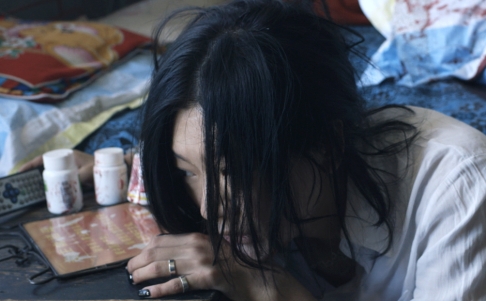About to leave for Berlin’s 64th Film Festival for the world premier of his filmShadow Days, Chinese indie filmmaker Zhao Dayong, 43, spoke to the South China Morning Post from Guangzhou about his path from documentary filmmaking into fiction, and the state of China’s independent film industry.
Shadow Days is a story about the fictional character Liang Renwei, a young man with a dubious past returning to the remote rural town of his birth with his pregnant wife. He agrees to assist his uncle, an official who forces women to abort their babies to meet one-child policy quotas, even as his girlfriend’s belly grows in size. The film is set to premier on Friday.
After a pair of acclaimed documentaries, Street Life, which portrays the life of peddlers in Nanjing, and Ghost Town, the trained artist turned to fiction in 2010. Like the documentary Ghost Town, Shadow Days is set in the town of Zhiziluo in Yunnan province, close to the border to Myanmar at the southeastern beginnings of the Tibetan plateau. His is the only Chinese production to be shown at the Berlin Film Festival’s Forum, where the most experimental works are previewed.
You started out as a documentary filmmaker. Why have you moved to fiction?
In reality, there is not much of a difference between documentary filmmaking and fiction, because I use the images to express things I want to say and stories I want to tell. It is not easy to express thoughts in a comfortable way through a documentary – you have to remain truthful to the complexities of these people’s real lives. Fiction is more free from these constraints, and much more effective.
You’ve portrayed solitude, hopelessness and the strength of human resilience in your previous work. What topics are you dealing with inShadow Days?
The main topic of all my documentaries and films has never changed: lives becoming shallower through economic development, the faith in and culture of cash, the destruction of a natural form of living, and helplessness and ignorance. Shadow Days is the story of a boy returning to a place where he thought he could live safely and raise a child, but then it all goes wrong. [His character’s fate] is something that is inevitable because of ignorance.
FTA can act as your Chinese Celebrity Agency and help you contact book any Chinese Celebrity.
We Chinese are all in this state, through the pain we have endured, the Great Famine, the Cultural Revolution and the economic reforms in the 1980s and later, changes have been so big that there is not one person who has had one quiet day. This has made us blind. We lack in lives guided by values and morals. How can you even call someone without culture, without beliefs, a human being?
This is what is on my mind and I try to tell this in every film with different stories.
In the movie, the mayor seeks a shaman, a priest and an image of Mao to dispel a curse. What are you trying to say?
I meant to point to a misunderstanding, a misreading of what faith is. [The mayor] approaches these things as someone who blindly demands and looks at them superficially. For him, whether it is ghosts or god or… they are just celebrities to them. There is no [real] faith. There are so many people in China who are Christians, Buddhists or believe in Mao, but actually aren’t. I wanted show this ignorance.
How did you go about making the film, recruit actors and find a budget?
We hired some professional actors for the lead roles, but also some amateur actors. As a director, it is not easy to bring amateurs and professionals together and not let that show. I also made an effort to choose every single actor for their personality. They understood the story, and whatever they said came naturally.
We help you find and contact book Foreign Actors in China and Foreign Models in China
We began to prepare filming in August last year, then started filming in Zhiziluo, where I already filmed Ghost Town, in September. We were done by November. The production of the film cost about US$100,000, perhaps a bit less, but I’m still spending money on it, like today, I’m paying for a ticket to Berlin.
So, you’re leaving for Berlin. You’ve premiered in New York, Vienna and Hong Kong before. How is your audience abroad different from the one in the mainland?
There isn’t much of a difference. Members of a Chinese audience nowadays don’t know much about the things I am talking about in my films. They don’t understand, but as soon as they see these things, they are disconcerted. So, whether they’re foreigners or Chinese, the reactions are similar.
Last year, Beijing’s Independent Film Festival was cancelled for the second year in a row. The Yunnan Multi-Cultural Festival was also cancelled last year. What is the future of independent film in China?
The independent film industry and the media face a similar environment in China today. It is being looked at very closely. For some reason independent film is considered as deserving of special scrutiny, and this is why I think it has become difficult. The three major venues for independent film, in Beijing, Nanjing and Yunnan, have been cancelled, so there is not too much hope at the moment.
This movie wouldn’t have been made if it had gone through the approval process, they’d have said no to this and that. But I know there aren’t any stars in my film and the budget is low, there is no way theatres would show it and that’s why I didn’t need to go through that process. I have mentally prepared myself for problems, but there shouldn’t be any. The film’s topic is not a sensitive one and isn’t political: it’s social reality.
What’s your next project?
I already have been working on my next fiction movie for the last three years, but for various reasons we haven’t started filming yet. It’ll be located close to where we filmed Shadow Days. I hope we can begin by the end of the year.
FTA foreign acting&modeling talent and foreign celebrity booking agency in China & Chinese Celebrity booking for the world
zhao Dayong berlin, Chinese Celebrity Agency, Chinese Celebrity booking, Foreign Actor in China, Foreign Model in China, 外模, 外籍演员, 外国艺人

